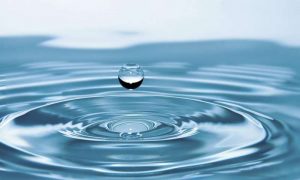Have you ever taken an ice-cold shower, dumped a bucket of ice water on your head, or leaped into a freezing cold lake? You might have felt a sudden jolt of adrenaline rushing through your body, with your heart pumping faster and your breathing rate increasing.

Water. (Public Domain)
When the body is submerged in cold water, cold receptors in the skin activate of the sympathetic nervous system, known for causing the so-called “fight-or-flight” response. These responses include increased blood pressure, increased heart rate, and increased breathing rate, which are all immensely useful during physically stressful situations. The metabolic rate also drastically increases as the body attempts to heat itself up; in fact, previous studies have recorded up to 350% increases in metabolism when study participants were immersed in 14°C water! [1]
Blood dopamine and norepinephrine levels have also been shown to increase with cold water submersion, but not epinephrine levels. [1] This suggests that many of the responses are directly due to sympathetic activation and not circulating epinephrine from the adrenal medulla. [2]
Another response you may have noticed is the sudden involuntary gasp for air, which is part of the cold shock response. Even if you are just taking a cold shower, the activation of cold receptors also causes this response, without directly activating the sympathetic nervous system. [3] Sadly, this gasp is also known to be a factor in drowning in cold water, as people may inhale water when suddenly immersed.
The next time you take a cold shower or jump into a freezing cold lake and you feel that sudden shiver and adrenaline rush, remember that it’s your body’s way of reacting to the sudden stressor! Maybe you should ease in next time!
Sources:
[1] Srámek P, Simecková M, Janský L, Savlíková J, Vybíral S. Human physiological responses to immersion into water of different temperatures. Eur J Appl Physiol. 2000;81(5):436-442. doi:10.1007/s004210050065
[2] Keatinge WR, McIlroy MB, Goldfien A. Cardiovascular responses to ice-cold showers. Journal of Applied Physiology. 1964;19(6):1145-1150. doi:10.1152/jappl.1964.19.6.1145
[3] Tipton MJ, Collier N, Massey H, Corbett J, Harper M. Cold water immersion: kill or cure? Experimental Physiology. 2017;102(11):1335-1355. doi:10.1113/EP086283
